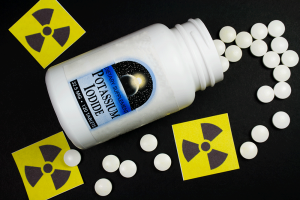Use of Iodide in a Disaster: How and Why to use it
January 31, 2023 by admin
Filed under General Emergency Supplies
 Iodide is a crucial element that plays a significant role in maintaining human health during disaster situations. The element is used to prevent the absorption of radioactive iodine by the thyroid gland, which can cause severe health problems such as radiation sickness, cancer, and thyroid disorders.
Iodide is a crucial element that plays a significant role in maintaining human health during disaster situations. The element is used to prevent the absorption of radioactive iodine by the thyroid gland, which can cause severe health problems such as radiation sickness, cancer, and thyroid disorders.
In a disaster situation, radioactive iodine can be released into the air, water, and soil due to nuclear accidents or the detonation of nuclear weapons. When inhaled or ingested, radioactive iodine can be absorbed by the thyroid gland, leading to long-term health consequences.
To prevent the absorption of radioactive iodine, iodide is used in the form of potassium iodide (KI) or sodium iodide (NaI). These iodide salts are taken orally and help to saturate the thyroid gland, preventing the uptake of radioactive iodine.
One of the key reasons for using iodide in disaster situations is that it is a simple and effective way to protect the thyroid gland. Unlike other protective measures, such as evacuation or sheltering in place, iodide can be taken quickly and easily, making it a reliable option in emergency situations.
Iodide is also readily available and affordable, making it an accessible option for people in disaster-stricken areas. Additionally, iodide is well-tolerated by the human body and has been used for decades as a dietary supplement to prevent iodine deficiency.
However, it is important to note that iodide is not a cure-all solution and should not be relied upon as the sole means of protection against radioactive iodine. Iodide is most effective when taken before or immediately after exposure to radioactive iodine. Therefore, it is essential to have access to iodide as soon as possible after a disaster event.
In addition to being used for individual protection, iodide can also be used in a larger scale in disaster situations. For example, iodide can be added to public water supplies to protect the entire population from exposure to radioactive iodine.
In order to maximize the effectiveness of iodide in a disaster situation, it is crucial to have a well-planned and coordinated response. This includes having adequate supplies of iodide on hand, clear communication channels to disseminate information to the public, and trained personnel to manage the distribution and administration of iodide.
It is also important to consider the specific needs of different populations, such as children, pregnant women, and those with underlying medical conditions. For example, children may require lower doses of iodide compared to adults, and pregnant women may need to take additional precautions due to the potential risks to the developing fetus.
In conclusion, iodide is a critical component of emergency preparedness and response in disaster situations. Its ability to prevent the absorption of radioactive iodine by the thyroid gland makes it a simple and effective means of protecting human health. However, the effective use of iodide in disaster situations requires careful planning, coordination, and consideration of the specific needs of different populations.










